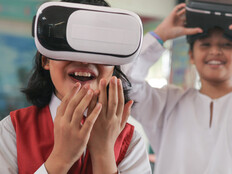Waterworks
Students mix local research with global collaboration in this river study.
Lesson description: This lesson is for middle- and upper-school students, but it can easily be adapted for younger students. As an interdisciplinary unit, it can be used in any curricular area. Teachers involved in this river study initially collaborate via a wiki in which they describe the specific activities for this project that fit the different curricular goals of each discipline involved. Once the wiki is finalized, the students’ scientific and historical investigations start. Activities are shared with teachers and students in other parts of the world by using a variety of technologies (digital video projects, podcasts, Web site creation, videoconferencing, data comparison using charts and graphs, instant messaging, wikis, blogs, e-mail, and so on). Students collaborate with students in the other locations and share their final projects and research results.
Subject area: This is a cross-curricular project that can focus on any number of disciplines, including science and math. Students use probeware, microscopes and global positioning system devices to conduct water quality studies of the river. In addition, students access Google Earth for satellite photos of the river and its surroundings. Nature journaling is done to improve students’ skills of observation and analysis. The students’ investigations include the use of digital video and digital photography and other technologies in order to share the results of their studies. Students in math classes make comparative analyses of data collected in the science classes and chart that data.
Curriculum Standards: These lessons and the global collaboration address many of the skills outlined by the Partnership for 21st Century Skills, including:
- Using 21st-century skills to understand and address global issues;
- Learning from and working collaboratively with individuals representing different cultures;
- Using technology as a tool to research, organize, evaluate and communicate information.
Resources: The following Web sites offer useful information for planning this lesson:
- Stroud Water Research Center
- Center for Environmental Education’s Rivers of Life
- Project Wild
- Rivers Institute at Hanover College
- Earth Force’s Global Rivers Environmental Education Network
- National Educational Technology Standards (NETS) for Students 2007
Grading Rubric: The grading will be done within each curricular area. A rubric for assessment should be clearly presented to the students prior to the activities involved in the unit. Assessment should involve the core curricular skills that are addressed in the unit. Twenty-first-century skills such as global collaboration, technology utilization and media production should also be included in the assessment process.
Teaching Tips
- Bring in local experts such as environmentalists to work with the students during the project.
- Start collaborating with teachers and students in another location at the beginning of the project and involve them throughout all facets of the project.
- Let students direct part of the learning process themselves. This helps to develop a community of independent learners.
- When students learn about the environmental threats to the river, have them take action to help remedy the problem.
- Have students use technology to create multimedia projects showing what they learned, and allow them to share their discoveries locally and around the globe.







